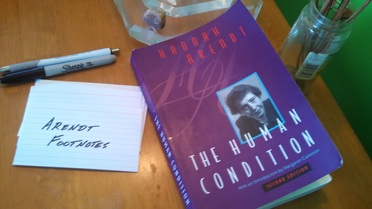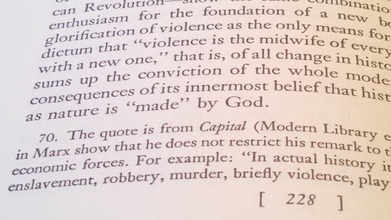
The Human Condition, p228
The University of Chicago Press (1958)
Beginnings
Let’s start with three sentences (headers added), a footnote and comment.
Making in the Modern Age:
“Only the modern age’s conviction that man can know only what he makes, that his allegedly higher capacities depend upon making and that he therefore is primarily homo faber and not an animal rationale, brought forth the much older implications of violence inherent in all interpretations of the realm of human affairs as a sphere of making."

“This has been particularly striking in the series of revolutions, characteristic of the modern age, all of which – with the exception of the American Revolution – show the same combination of the old Roman enthusiasm for the foundation of a new body politic with the glorification of violence as the only means for 'making' it."

“Marx’s dictum that 'violence is the midwife of every old society pregnant with a new one,' that is, of all change in history and politics, (footnote #70) only sums up the conviction of the whole modern age and draws the consequences of its innermost belief that history is 'made' by men as nature is 'made' by God.”

Footnote for Any Age:
"70. The quote is from Capital (Modern Library ed.), p. 824. Other passages in Marx show that he does not restrict his remark to the manifestation of social or economic forces. For example, ‘In actual history it is notorious that conquest, enslavement, robbery, murder, briefly violence, play the great part’ (ibid., 785).”
Shivitti.
Today’s (1964) video: Hannah Arendt “Zur Person” Full Interview (with English subtitles)
*Next Ew Publishing: Black history American exceptionalism and Carl Sandburg’s Chicago of 1919, a William Abens special this Friday 27 February.
Posted by Bryan W. Brickner
 RSS Feed
RSS Feed
